Thursday, February 23, 2006
New Look
Saturday, February 18, 2006
End of Faith
"Robert, you're a logical-minded guy. you don't believe in any of this faith stuff do you?"
I replied "Well, John, yes I do." John blanched, got very incredulous, and proceeded to try to convince me that any sane individual who can think would discredit the existence of God. So, in his mind, I and so many others have been brainwashed away from the truth.
I'll get around to reading the book eventually. I do occasionally read stuff that is contrary to my own beliefs. For example, political conservative that I am, I read Al Franken's Lies and the Lying Liars Who Tell Them to gain some understanding of those who think differently than me.
So, while I will not talk about the book, per se today. I do want to share of my thoughts about the whole anti-religious movement that is going on. A common theme when it comes to politics and religion is that complicated as they can be, people want to simplify the whole argument by dividing it into just two sides. In this case, it seems to me that the anti-religion group wants to believe that people fall into two categories:
- You are a religious nut. You reject science. Your life revolves around meaningless rituals and rules. You behave as you do because a grand reward awaits you after you die if you do what your spiritual leaders tell you is right. Therefore, if your spiritual leader tells you that strapping dynamite to your body and blowing yourself up in some bar is what your god is asking of you, then you had better do it.
- You have seen the true light. You realize that religion is for the weak-minded. If humankind would embrace science and sensibility, the major problems of the world would be solved.
What my father in law and others don't seem to understand is that people like me can believe in creation and evolution. They really aren't mutually exclusive. It is for those who insist that every word in the Bible is the written word of God, himself, but I put people like that in the category of extremists.
So, I ponder...
Could God have started the Big Bang or perpetuated the Steady State? I ask this because I have to wonder how far and to what level science can explain the universe. If there was a Big Bang, how did it get there? If science reveals that the universe existed in some form before the Big Bang, then how did that get there?
A human being consists of a combination of chemicals put together in such a way that it moves about, breathes in oxygen, consumes proteins and carbohydrates, and has the ability to contemplate his/her own existence. A scientist can explain how it took billions of years for the process of evolution to mix the chemicals just right in order to make a man or a woman. As one of these human beings, I cannot help but wonder in the mysterious darkness and silence at night if that is really all I am. Did people before me create God to account for this or is a mysterious God really behind all this daring us not to believe in him?
Is religion a crutch? Is it an excuse, allowing us to justify bad behavior? In other words, does religion perpetuate evil? Would the Crusades, the Spanish Inquisition, the 9/11 bombing have occurred if religion did not exist? If not, then it would seem that religion is the bane of the human race. This is what my father in law and many atheists believe.
Those of us with faith, however, believe in moral choice. An individual chooses his/her path, whether they have religious beliefs or not. If a terrorist claims he did some evil deed in the name of Allah, the evil resides in the individual, not Allah. That goes for God, Jehovah, Vishnu, et. al.
I have faith. I have a scientific mind. It's possible, really.
Sunday, February 05, 2006
Sunday, January 29, 2006
The Freeway Factor
Separating these two towns and surrounding the entire area was a primarily rural landscape. Tree farms were dominant - mostly of the citrus and walnut variety.

Many of the executives of Hollywood and Los Angeles lived in the surrounding rural San Fernando and San Gabriel Valleys. These well-to-do types liked the comforts and seclusion of country living. There was a problem, though. It took considerable time driving back and forth over windy canyon roads from home and work. So, they came up with a brilliant idea.
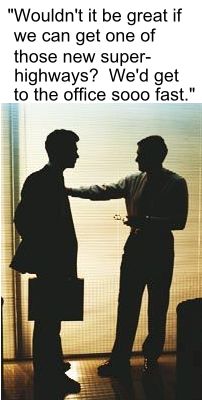
So, a couple of freeways were built. All was wonderful.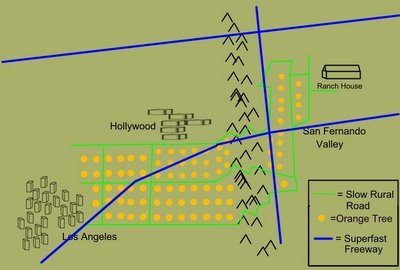
In fact, the executives figured out that real-estate values went way up. They decided to take advantage of the situation.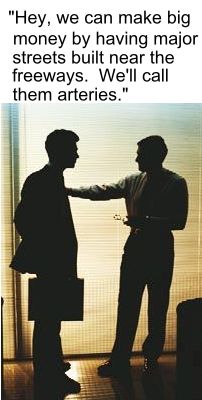
Arteries were constructed. Almost instantly, gas stations and restaurants were built where the arteries met the freeways. Gone were many of the orange groves. People moved near these arteries to take advantage of the superfast freeways.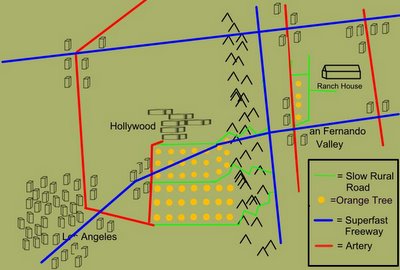
Soon, the executives got a little concerned.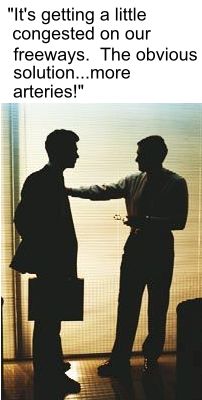
Eventually, Southern California became a big urban mess. It turns out, adding freeways only adds too many people and more congestion than before.
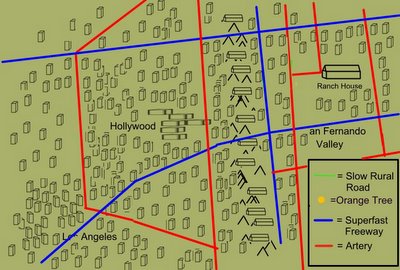
Of course, the executives moved to escape the concrete jungle to nice rural communities like Denver and Phoenix.
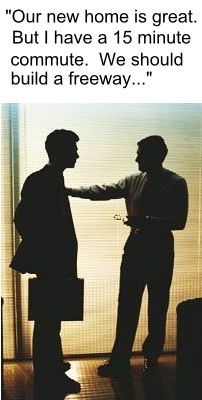
People can be really stupid.
Monday, January 16, 2006
Martin Luther King Day
Friday, a co-worker of mine mentioned that the next Monday (today) was a holiday but he wasn't aware which one it was and whether we had the day off. I told him it was Martin Luther King Day. He subsequently looked at his hands and arms and then stated "Not my holiday". His skin isn't black (it's not white, either). Obviously, Dr. King's message hasn't gotten through to everybody.
"I have a dream that my four children will one day live in a nation where they will not be judged by the color of their skin but by the content of their character."
For the entire "I have a Dream" speech, you can click here.
This rings very true today to me and I am often bewildered how such a sensible sentiment is ignored by so many of one race (whites) and mis-interpreted and twisted by so many of another race (blacks). Without going into too political a discussion, I just ask you to look at the quote above one more time and try to understand the simple but powerful message.
One more thing. We no longer have Columbus' Day. It is now Discovery Day. We no longer have Lincoln or Washington's Birthday. We have President's Day. That means we now have only two holidays that are about specific individuals. They would be Christmas, which celebrates Jesus and Martin Luther King Day. It does not seem fair to me that Dr. King is the only American with his own holiday. I say we should change this day to Civil Rights Day and honor all those in addition to Martin Luther King who fought and continue to fight for equality of opportunity for everyone.
Saturday, January 14, 2006
Cars, Cars, Everywhere but Not a Road to Drive
Wednesday, January 04, 2006
White Christmas
I did had some interesting political discussions with my father in-law John Lefever. I will discuss these in succeeding posts.
Summary
This was the third time I've landed at Newark airport and I still have the darndest time finding the freaking Garden State Parkway. This time, we drove 20 min in the dead of a cold night (it was around 2am EST) convinced we were on the right road, which, of course we weren't. Finally we sorted it out. Man, I hate driving in New Jersey. Every ten minutes, you've got to stop and pay $.35 toll. The travel guide tells us that this is a "convenience" to break up the monotony on the road. Yeah, sure! New York is much better, you only pay the toll when it's time to leave the thruway.
We finally arrived at my mother in-law's house in West Hurley at 4 am. Friday the 23'rd of December. We went to the Kingston mall and did all our Christmas shopping that day. We spent Christmas eve at the home of my brother in-law Dan and his wife Diane. Gifts were exchanged and we played a rousing game of Trivial Pursuit - Pop Culture Edition where we all proved how unhip we are because nobody did very well. There were way too many references to Jessica Simpson, Justin Timberlake, and reality TV - subjects I'm barely aware of.
Christmas day was spent in recovery and the evening was spent at a party of one of my mother in-law's many friends. My mother in-law, Edith Lefever is head of the Performing Arts of Woodstock (PAW) community theater group and is practically a celebrity of the Woodstock community.
Monday, the 26th, we got up early and drove 150 miles to Utica, home of my relatives. We spent the day with my Uncle and Aunt Vito and Mary Ernest. I met cousins of mine, Paul, Elizabeth, and Diane, whom I had not seen since 1972 (I was 9 then). My cousin Nick was also there. I had seen him as recently as 1979. My uncle gave us a tour of Utica. I don't think the entire town has a building newer than thirty years old. It is very run down and there is no development anywhere, it seemed. What a contrast to California and the rest of the west! We had a good dousing of snow that day. It came down hard all afternoon while Michelle and I had hot cocoa and looked at photo albums of my aunt and my mother when they were in their twenties and thirties. My Uncle Dick and Aunt Doris came and we were treated to a real italian dinner with home-made pasta, just like my mother used to make. I actually had to scrape snow off our rental vehicle that night before we drove to our hotel.
Tuesday, we drove back to West Hurley, rested, and went to see Syriana (my mother in-law's choice). Syriana is one of the most convoluted, confusing, pointless, and worst movies I have ever had the displeasure of watching. I had thought the cinematic low point of 2005 was Hitchiker's Guide to the Galaxy but I stand corrected.
Wednesday, we went to Julanne Sapronetti's house in Sturbridge Mass. It was another 150 mile drive. Julanne was Michelle's maid of honor at our wedding and was Michelle's college roommate a long time ago in a galaxy far, far away. She married a fellow named Jan since our wedding so we got to meet him.
Thursday, it rained and rained and rained. It was a messy drive back to West Hurley. Much of the snow was gone by then. We had one more hurrah with Dan, Diane, John, and Edith before our trip back home.
A great trip for both of us. Too bad it had to end. Happy New Year everybody and Go Trojans!
Sunday, December 18, 2005
The DVD Situation
Friday, December 16, 2005
From John Adams of the Nation Resources Defense Council (NRDC)
"It's the most outrageous scheme yet to open the Arctic National Wildlife Refuge to oil drilling. We have just learned that pro-drilling Senators are sneaking their Arctic drilling measure into the Defense Appropriations bill."
...
"But some Senators are so shameless in their quest to boost oil company profits that they're willing to exploit the Defense Appropriations bill, which is meant to fund our troops in Iraq and other military needs.Your Senators will be under enormous political pressure to vote Yes on the Defense Appropriations bill no matter what's in it. We're counting on a last-ditch effort by a determined group of senators to filibuster this bill until Arctic drilling is removed. In that case, the oil industry and their allies would have to get over 60 votes to keep drilling in -- something they have never been able to do."
While I lean to the right on many things, I am disgusted by the desire of many republicans (and a few democrats) who want to open up the Alaskan wilderness to save Americans, perhaps, $0.02 per gallon. This bill has already been shot down so now some senators are trying to attach it to another bill that has a strong chance of passing.
For more information, take a look here:
http://www.nrdc.org/land/wilderness/arcticrefuge/facts3.asp
Wednesday, November 30, 2005
Tuesday, November 22, 2005
- I am thankful for my wife Michelle, for she makes life worth living, in good times or bad.
(The rest are in no particular order)
- I am thankful for my parents. May they continue to share life together, a good while more.
- I am thankful for my roof over my head, the food I can eat, and a warm dry place to sleep.
- I am thankful I have the means to provide myself and my wife the above amenities.
- I am thankful I have the tools to express my creativity.
- I am thankful to the friends I have (Jeff, Lisa, Lee, Erik, Michele, Steve, Randy, Reggie, Gloria) as good ones are so hard to find.
Remember that Thanksgiving is the only true American holiday. Remember the significance of what it means and please don't disgrace it by referring to it as "turkey day".
Have a pleasant and safe Thanksgiving.
Sunday, November 13, 2005
The Liberal Media (Part 2 of a Series)
Chapter 1
The Liberal Cinema (Continued)
Last week, I pointed out some examples of how politicians, particularly the President of the United States are portrayed in recent films. Notably, liberal politicians are good and care for the people, while conservatives are basically, not. There are many examples of this other than the four I specifically mentioned. In these film, the liberalism of cinema is pretty obvious. The same mindset is in many other, if not most Hollywood productions. The liberal innuendos can be more subtle in these films.
The De-John Wayne(ing) of the Cinematic Hero
John Wayne was the man that many boys growing up from the 1930's to the 1970's wanted to be. He was the gold standard for a movie hero. He portrayed quiet strength, independence, conviction, and confidence. He played characters who were a bit set in their ways, but had a good heart and gradually learned to accept change. I don't think it's a stretch to say that John Wayne represented an ideal of the complete conservative. When you look at the past three republican presidents (Reagan and the two Bushes), Americans saw them as the John Wayne cowboy type.
Wayne died in 1979 and by then, America had changed, mostly due to Vietnam. The war was not only unpopular, America lost it. In losing the war, America lost a lot of its mystique of being good and undefeatable. Hollywood reflected this. With a few exceptions such as Clint Eastwood's Dirty Harry and Harrison Ford in Star Wars, the 1970's was not much of a decade for the John Wayne type of hero. Even the James Bond franchise changed from practically a british version of John Wayne in Sean Connery to a softer, more jovial Roger Moore. The 1980's featured a comeback of the John Wayne hero in Sylvester Stallone, Arnold Schwarzenegger, Harrison Ford, and Bruce Willis. Timothy Dalton brought back the grim James Bond. Then the 1990's came and Hollywood changed.
No Longer a Hero
In the 1990's, Hollywood seemed not only reluctant to show macho, white male heroes. They even produced movies to bring them down and expose these stereotypical heroes as bigots and anachronisms. I will discuss two of these films.
A Few Good Men
Here's another Rob Reiner film and one that I enjoy and respect. Jack Nicholson plays Colonel Nathan Jessup, an ultra-tough, militant bulldog who lives his life on words like "honor, code, loyalty". He is practically the second coming of John Wayne. In this film though, John Wayne, er Colonel Jessup is also corrupt and is revealed to be still living in the cold war. The lawyer, Caffey played by Tom Cruise, is the "Harvard mouth" with the "faggoty white uniform". He tricks Jessup into revealing he was responsible for the murder of one of his Marines. Apparently, a little know trait of John Wayne heroes is they are very gullible.
Crimson Tide
This is a favorite film of mine. It features some terrific performances by Denzel Washington and Gene Hackman and a very realistic feeling and tense situation. This time it's Gene Hackman as the anti-hero. He too, runs his life by rules of tight discipline. Unlike in A Few Good Men, Hackman is not corrupt, he is merely so conservative, it blinds him enough to make an error in judgement that nearly leads to World War III.
There are similar films that convey the same message. We have Wesley Snipes instead of Sylvester Stallone, Lara Croft instead of Indiana Jones. Even if the hero is a white male, as in Titanic or Spiderman, the guy is hardly the hearty John Wayne type. Instead it's skinny little guys of whom John Wayne would have kicked sand upon. As for westerns, the 1980's featured Pale Rider and Silverado, both of the heroic variety. The 1990's featured Unforgiven, where Clint Eastwood paints the dark side of being a gunslinger and in doing so, de-mythologizes his earlier roles as that type of individual. We also got Dances with Wolves where Kevin Costner turned his back upon the U.S. Army and became a Sioux Indian. Yes, in Hollywood today, its How the Left has Won.
Friday, November 04, 2005
Prologue
Chapter 1
The President
Tuesday, October 25, 2005
Before I go too far here, I completely respect Tommy John. He loves baseball and had an opportunity to extend his career by bravely going through the surgery. However, I do wonder today when it seems every other pitcher in the major leagues has gone through what is now called "Tommy John surgery". Pitchers are claiming their arms are stronger after the surgery than ever before.
Pitchers have it tough. Baseball fans tend to love lots of offense so pitching stars don't measure up in popularity as hitting stars do. Throwing a baseball 90 mph repeatedly is not a natural motion for a human being. Damage to muscles, tendons, ligaments, and bones are commonplace, even before a pitcher gets to the major leagues. But now, it seems that when a young pitcher gets his first pitching injury, they go for the "Tommy John surgery". As I watch the World Series, I heard the announcer mention how White Sox pitcher Jenks has a "bionic arm" due to his surgery.
Steroids aren't for pitchers since bulking up only inhibits their ability to pitch. So the surgery seems to be their answer to hitter's supplementing themselves. Let's see if this becomes a similar issue as the steroid problem.
Friday, October 21, 2005
Alas, things never goes as they should. I work with attorneys, specifically big city (Los Angeles) attorneys who deal with multi-million dollar lawsuits. When corporate lawsuits occur, each side will inundate the other with invoices, drawings, contracts, letters, emails, financial reports and all sorts of goodies. Many law firms deal with this stuff completely electronically and hand over CDs (or DVDs) filled with electronic documents. Unfortunately, you'll always get the one firm or attorney who insists on actual paper. To me, a CD holding 10,000 pages that I can search through on a laptop computer is far more appealing than scrounging throught 3 25lb banker's boxes. Yet, our office is in a seemingly constant state of printing out and boxing up paper documents because an attorney insists on doing it the old fashioned way. It is not uncommon for a job to consist of 100 boxes or more. That's 300,000 pages that has to sit in some warehouse somewhere for attorneys and paralegals to find their key documents. It's absolutely unbelievable!
Saturday, October 15, 2005
Erik and I got tangled in another topic. Look here. It was another thread that started to get personal. I'm going to rebut here simply because I can illustrate my points better on my blog. Also, I feel this discussion has a broad enough theme to address it here.
The Premise
From Left Over Right
"Terror Level
I wonder when there is going to be a raising of the national terror alert level from yellow to orange. After all, whenever Bush's numbers seem to fail that's when it's raised AND there is an election next year for senate and congress so it seems logical for Bush to use that to his advantage."
Erik states that it "seems logical" that there is a correlation between the terror level and Bush's approval rating. Basically, he believes that Bush and his staff artificially raise the terror level so the American people get a positive feeling that Bush is doing his job protecting Americans. I want to point out that Erik did use the word "seems" because it's important. I called his post a "conspiracy theory" based on:
A. His statements were about a conspiracy of Bush pulling a fast one on the American people.
B. It is a theory given that Erik gave no arguments to support his statement other than alluding to that it "seems" that the terror level rises in accordance with Bush's lowered approval rating.
Theory or Fact?
Erik took exception me calling it a theory. Suddenly, to him, it was factual. His initial post certainly did not have a feeling of fact. In my opinion, Erik took my statement personally and let his emotions take over his brain and turn his theory into fact. I tried to point this out by putting out my own conspiracy theory:
"The Indianapolis Colts are 5-0. Therefore, I can conclude and state as 'fact' that the Colts have bribed the NFL referees handsomely."
I intended this statement to satirize Erik's claim. I don't believe this theory for a second. I just wanted to point out that it's easy to come up with conspiracy theories. I like to use analogies in my arguments. I hoped that Erik would pick up on this and realize that if he wants to convince me his statements are factual and not theory, he was going to have to come up with a better argument.
A Better Argument
I didn't get such an argument from Erik. Instead, he chose to call my conspiracy theory nonsense (which it probably is, but that's not the point). Worse, he decided that I had to come up with facts to prove his statement incorrect. Wait a minute! It is Erik's statement, not mine. In fact, never once did I ever say he was wrong. Yet, he tried to put the ball in my court when the ball is clearly in his. I have nothing to prove but Erik does. I asked for facts, but Erik, in turn did the literal equivalent of cupping his ears and stammered that it was up to me to provide facts to prove him wrong. This was clearly childish behavior and when I called Erik on it, well, he didn't take it so well. So, I walked away from the discussion as it was going nowhere.
So, my point is; If you are going to make accusations about people, politicians or not, either call it a theory or provide comprehensive evidence to support it. You can't call your own theories "fact", you have to convince others and have them agree with you to even begin to consider it fact.
If Erik wants to support his theory, then he needs to provide something like the following:
(Please note: the figures here are purely made up and are for demonstrative purposes only)
Click on image for full sized view.
Friday, October 07, 2005
Recap
Last week, I posted about the world-wide problems that confront the human race now, and even more so, in the future. If we do not confront the issues of overpopulation and consumption of resources, one of two things is going to happen eventually.
1. Nature will balance its books one way or another. Disease, natural disasters, and/or a giant meteor will wipe out most if not all of the human race. If and when this happens, the world will be restored to its relatively balanced self in 10,000 years and all will be fine on Earth and there will be no more humans.
2. The human race will beat nature to the punch and destroy itself in nuclear holocaust.
So, when I hear solutions like "tax incentives" (sorry Erik) or anti-poverty programs I sadly shake my head because I realize that most humans are too self-centered to see big picture problems and big picture solutions.
The answer's up there
Look upwards, not at the birds, or the airplanes or the clouds. Look at the universe. It's really, really big. It's loaded with solar energy and hydrogen. Ultimately, the answers to all of humankind's major problems are in outer space. Solar collectors can be installed and provide all the clean energy we could ever want. Hydroponic farms in space stations can produce food in abundance. The Moon has as much real estate as planet Earth and there's Mars as well. Why not live there? Does this all sound like science fiction? Yes, I'm afraid it is but it doesn't have to be.
So why are we not colonizing space?
Unfortunately, we keep these ideas in the realm of science fiction because most of us don't really believe it can be done. Also, even if it can be done, too many of us feel that there are too many earthbound problems to deal with before we go to space. Yet another problem for most people is that we won't see space exploration realize the promise it can offer for many, many, years, perhaps, not even in our lifetimes.
This saddens me as I realize more and more, that we are too short-sighted to survive. We are always going to have domestic problems. The economy will never be good enough. We always find an excuse to not fulfill what should be our destiny of leaping from our planetary cradle. In other words, we are too self-centered and when it all comes down to it, we really care more about our individual lives than we do for our children and their children.
For me, this is the issue of our time. I look to any leader with the courage to restart the space program that Kennedy started over 40 years ago. We need to start now and we need to realize that we need to stay committed to it. I like President Bush's proposal of going back to the Moon and to Mars. I'd like to believe we will stay the course and take the baby steps needed in order to get our foothold in space. Let's do it, not for ourselves but for our children's children's children. (Thank you, Moody Blues)
Thursday, October 06, 2005
It's good to see one of my favorite spectator sports on TV again. (It's purely a spectator sport for me, I can't skate.) I'd gripe about greedy players and owners but I've pretty much given up on going to games a few years ago.
I want to make a few comments on some of the new rules:
Good
Losing the redline and allowing passes from inside the blue line to center ice: A rule that makes sense and promotes a more free and faster-paced game.
Limited equipment and padding on goalies: This rule also promotes a faster games. Goalies were able to practically cover the entire net making goals almost impossible to get from a good shot. Goal scoring was getting ugly where it required big men up front to get rebounds and knock out defenders. If Wayne Gretzky had come up in 2000 instead of 1980, I doubt he would have been nearly the player he was as the NHL got big and slow. The new rule promotes more athletic goaltenders.
Bad
Shootouts in the event of a tie: I've got several issues with this one. First of all, the other rules should open up a faster, more wide open game. Breakaways should be more common than before so there is no need to have this. Also, teams with the better pure scorers are apt to sit on a tie in the third period so they can have their chance to win in the overtime shootout, thus, slowing down the game. Finally, a shootout is just plain not hockey.
My solution? How about having a 15 min sudden-death overtime period. If someone scores, they win. If the game is still tied after 15 min. both teams lose. Think, maybe we'd see some exciting action in overtime with this rule in place? I do.
Friday, September 30, 2005
Pollution, disease, famine, drought, energy, and war; These are the main general concerns of the human race today and most likely, in the foreseeable future. We spend billions of dollars, conduct rallies and protests, create new laws and regulations, yet none of these problems are going away, in fact, they are getting worse. I have two reasons for this.
1. Population growth: It just can't be ignored that humans are continually taking up more and more space on planet Earth. We crowd out and defy nature and nature, in its own way, fights back and will ultimately win. Where humans are concentrated in densely populated cities, diseases thrive, resources dwindle and air, water and soil get polluted. Unless some kind of world-wide population control is done (don't count on it), we are going to get more of this. Also, conditions like this lead to large-scale discontentment, which leads to warfare.
2. Industrialization: America and Europe went through their industrialization periods in the last two centuries. Seemingly, the rest of the world is going through that now. So we are de-foresting and re-routing waterways to accommodate industry in Asia, South America, and Africa. Wetlands are nature's water filters and forests are nature's air filters and industrialization is destroying them.
We know the problems. What do we do? As I previously mentioned, we have thrown money at the problems and it seems that most people and governments rationalize that the problems still exist because we haven't thrown enough money at the problems, so we keep spending on better drugs, education, and scientific studies. Also, as I mentioned, we create new laws and regulations to curb emissions, save fuel, test our food better, and conserve water to name some. Is all this money and regulating solving anything? I don't think so.
So, to anybody who reads this, what is the solution in your opinion? I'll post mine next week.

